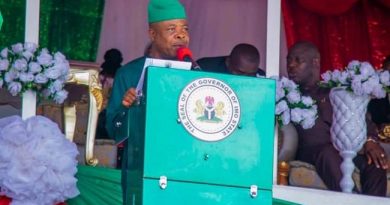Dangote Refinery: The Audacity To Dream By Shaka Momodu,
Amid the Nigerian conundrum and the raging Covid-19 pandemic which has seized our attention is a breath of fresh air, the soon-to-be-inaugurated Dangote Petrochemical Refinery. It was Kahlil Gibran in The Garden of the Prophet who wrote this powerful poem long ago but it speaks perfectly to the Nigerian conundrum today.
Here it goes:
“Pity the nation that is full of beliefs and empty of religion.
Pity the nation that wears a cloth it does not weave and eats a bread it does not harvest.
Pity the nation that acclaims the bully as hero, and that deems the glittering conqueror bountiful.
Pity a nation that despises a passion in its dream, yet submits in its awakening.
Pity the nation that raises not its voice save when it walks in a funeral, boasts not except among its ruins, and will rebel not save when its neck is laid between the sword and the block.
Pity the nation whose statesman is a fox, whose philosopher is a juggler, and whose art is the art of patching and mimicking.
Pity the nation that welcomes its new ruler with trumpeting, and farewells him with hooting, only to welcome another with trumpeting again.
Pity the nation whose sages are dumb with years and whose strongmen are yet in the cradle.
Pity the nation divided into fragments, each fragment deeming itself a nation.”
It is hard not to feel sorry for Nigerians. It’s even harder not to feel pity for this blessed land of our fathers which unfortunately has become the graveyard of ideas and dreams. The trouble with Nigeria is that it does not produce most of the things it consumes. In truth, it’s hard to see the passion in its dream. Those who should drive the future are instead engaged in showboating activities and playing politics with the destiny of the country. Since independence in 1960, the country has been shortchanged by the same calibre of people who have had the privilege to pilot its affairs. Successive leaders have been more content with Nigeria as a potentially great country. They have no vision and will not tap the talent and vision of others in policy formulation and implementation.
Many of our country’s peers that started off about the same time have either exited the “potentially great club” to the great club or are moving purposefully in that direction. Unfortunately, Nigeria is stuck in a rot, thanks to a feudal mindset in the ranks of the ruling elite.
There is no gainsaying the fact that the future of Nigeria’s economy lies in industrialization driven by sound and coherent policies, the creation of an enabling business environment complemented by a rugged determination to achieve results. But our leaders are yet to understand the real purpose of leadership. The Ajaokuta Steel complex was supposed to leapfrog the country into its own version of an industrial revolution. Since that project, like many others, has become a white elephant, the country has largely stumbled and fumbled, only mouthing intentions to industrialise without a road map.
But a lightning rod of sorts for an industrial renaissance or revolution is in the offing. It is not led by government that seems never able to get its act together, instead by a private initiative and funding. Enter The Dangote Refinery and Petrochemical Plant started six years ago and is 85 to 90 percent complete. It comprises a mega size oil refinery, fertilizer and petrochemical plants all three assembled in one vast location. Isn’t the economy set to get a boost? What better way to become self-sufficient in refining, fertilizer and petrochemical production than to have three strategic areas rising simultaneously from the ashes like a phoenix? The multiplier effect is beyond comprehension.
For Aliko Dangote, the promoter and financier of the multibillion dollar complex, it appears it might just be merely a matter of habit to continue to invest in a country whose political leaders revel in incompetence and whose allegiance is to their personal or group interests rather than progressing the big picture of developing the country. Despite the perception in some quarters of Dangote as an artful player of any government in power, his default tendency has been to keep expanding the frontiers of his business empire. He did this with his daring venture into cement production.
Armed with concessions from a government that understood how central local production is to the nation’s economic progress – the backward integration policy has paid off handsomely and the country has moved from a net importer of cement to producing all its cement needs and surplus for export. This has conserved Nigeria’s foreign exchange reserves and stabilised the prices of cement. Imagine for a moment what would have happened to our foreign reserves and the prices of cement if we were still importing it, at a time like this.
A recent plea by Alhaji Ahmed Joda to our leaders captures what Nigeria should be doing to move the country forward instead of the overdependence on foreign investors. His stark warning? No Foreign Direct Investment (FDI) has ever taken any country out of poverty. Joda hailed Dangote for his dedication to Nigeria’s development, saying if the country could have more people like him, Nigeria would be a better place. “In short, I always say, create 10 to 15 Dangotes and see what will happen in our country,” he stated.
He recalled that before Dangote ventured into the cement business, the two biggest cement companies in the world were operating small plants, with the biggest at the time doing about 300,000 MT per annum in Nigeria. The two companies were Blue Circle (UK) and Lafarge (France), which later merged. Joda stated that the companies were producing only small quantities of cement in Nigeria and preferred to flood the country with cement from all over the world.
He posited further and I agree that Dangote saw the opportunity that the foreigners knew, but was not in their interest to take because they don’t care about Nigeria, and he took it. He pointed out that Dangote decided to increase the capacity of the cement plant he bought to 2,000,000 MT per annum. Thereafter, he built a new plant (Obajana) with initial capacity of 5,000,000 MT per annum, expanded it to 10,000,000MT per annum, and other companies had no choice but to follow suit.
He commended Dangote for building one of the largest oil refineries in the world in Nigeria, whereas the multinational oil companies that have been operating in Nigeria for more than 60 years never deemed it fit to build a refinery (except the 60,000 barrels per day refinery in Port Harcourt by Shell built in the 60s). Instead, for selfish reasons, they take the crude oil to the refineries around the world, refine it and then, sell it back to us.
By far, Dangote’s most audacious and formidable venture yet is the Dangote Refinery and Petrochemical Plant. A gigantic undertaking that trumps all others. It is perhaps the most significant, breathtaking investment undertaken by one man in his quest to harness the vast potential in Nigeria and change the narrative of this country, nay Africa for good. It is a story of rugged individualism amid policy inconsistency in Nigeria. And the two pull in opposite directions.
Clearly, this is not a project for the faint-hearted, it is simply beyond the scope and capacity of many countries. It is the kind of mammoth undertaking that big developed countries or major multinational oil companies dare to venture into. This is what one man is single-handedly building and is nearing completion. Who says dreams can’t come true in Africa? Dangote has gone this far despite the headwinds from volatile economic realities, including repeated devaluation of the Naira which made borrowing cost higher and the seeming lack of support from government.
The plant will be a game changer for the Nigerian economy which is seriously gasping for breath. It will rewrite the story of our country and make every Nigerian proud and most importantly, sound the death knell for the criminality that has bedeviled the importation of refined petroleum products. I have written several articles on precisely the blind stealing and indefensible corruption in the oil sector, viz. the unbelievable fraud in the subsidy regime, the massive theft and round-tripping that has gone on for too many years without abatement and the never-ending turnaround of our obsolete refineries without results. The unexplained quadruple increase in the volume of petrol consumed daily has provided a coterie of local and international swindlers with riches far beyond their wildest imaginations. But the end is nigh! This refinery, which will soon be operational, will reveal Nigeria’s true daily consumption of all petroleum products and expose the humongous stealing that has gone on in the past several years. The plant when completed, can meet 100 per cent of Nigeria’s requirement of all liquid products. These include gasoline, diesel, kerosene, aviation jet fuel and fuel oils, and also would have surplus of each of these products for export.
In all, a total of $12 billion investment had been estimated by the Dangote Group to have been committed to the project. The refinery is expected to create a market of $11 billion per annum for Nigerian crude. It has been designed for 100 per cent Nigerian crude grades, with flexibility to process others which include all the African crude grades, a range of Middle Eastern crude grades and those from the United States. In a recent presentation, the Group Executive Director of the Dangote Refinery and Petrochemical Plant, Mr. Devakumar Edwin, pointed out that the project remains the largest single train petroleum refinery in the world, with a capacity of 650,000 barrels per day and 838 KTPA polypropylene plants.
When completed, Edwin added that the plant would encompass the world’s biggest fertilizer plant with a capacity of 3 million tons per annum; the largest sub-sea pipeline infrastructure in any country in the world spanning 1,100 kilometres, to handle 3 billion standard cubic feet (SCF) of gas per day. In that presentation, he also revealed that the facility would have world-scale gas treatment stations; a world-class petrochemical complex; and a 480MW power plant in the refinery and fertilizer complex.
The plant will maximise gasoline which is in high demand – 53 per cent of the production capacity compared to 22 per cent of the existing refineries in Nigeria. It would also help maximise value-added petrochemicals polypropylene and polyethylene, and minimise low-value fuel oils. Another benefit of the refinery and petrochemical plant to the Nigerian economy is in the area of job creation as over 100,000 indirect jobs through retail outlets would be created as there are 26,716 filling stations and 129 depots in Nigeria; it would bring about ease of availability of products and help open up service stations, and 2,600 trucks for transport would create additional jobs. Currently, there are about 3,580 Nigerian personnel at the site. This excludes employment by the various contractors and subcontractors at the site.
The challenge of skills gap which has over the years stunted growth in the oil and gas industry is one that the Dangote Petrochemical Refinery is expected to address by providing a platform for overseas specialist training. Not to be caught napping, the training of the first and second batch of engineers has been completed and they are being acclimatised at the site, while the third batch has left for India for training.
Edwin further disclosed that the Dangote Group bought 300 cranes to ramp up equipment installation capacity, since the current capacity in Nigeria is extremely low and presently has the world’s largest granite quarry to supply coarse aggregate, stone column material, stone base, stone dust & material for break water. It also bought over 750 equipment to enhance the local capacity for site works, since even Julius Berger, Dantata & Sawoe, Hi-Tech, etc., were unable to handle even small portions of the construction requirements.
Furthermore, it bought 1,000 trucks and tippers exclusively to cater to bringing aggregates, stones and sand and has set up the world’s largest ready-mix concrete capacity at any given location to produce ready-mix concrete including 72 concrete pumps and 141 transit mixers since the annual concrete manufacturing capacity in the country is inadequate. It is also setting up large oxygen and acetylene plant to manufacture wielding gases since the current capacity in Nigeria is inadequate and currently, 120 local contractors are at the site with orders of $368 million.
Presently, Dangote Refinery is the only company in Nigeria handling its engineering, procurement and construction (EPC) of the refinery. Globally, with the exception of about three companies, no one has done complete EPC. In Nigeria, NNPC, GTL and NLNG have not done EPC. In the area of fertilizer production, Dangote Industries Limited is constructing a breathtaking fertilizer plant. In Nigeria, the current consumption of urea is 700,000 tons.
This year, Nigeria’s population was estimated at about 207 million which would lead to increased food consumption. Estimates point out that around 5 million tonnes of fertilizers are required per year in Nigeria, in the next five to seven years bifurcated into 3.5 million tonnes of urea and 1.5 million tonnes of NPK. The Dangote Fertilizer project is the largest granulated urea fertilizer complex coming up in the entire fertilizer industry in the world, with an investment of $2 billion to produce 3 million tonnes per annum.
The fertilizer project alone is expected to save the country $500 million and provide $400 million in export revenue. It is also expected to spur activities in the agriculture sector. The supply of fertilizer would be enough for the Nigerian market and neighbouring countries. For decades, Nigeria has been accused of polluting the atmosphere by flaring gas while the country itself has been facing a shortage of gas.
The majority of IOCs’ gas development in the last 10-15 years has been for the export market. The huge gas resources are not being developed to meet domestic demand. The government has been unable to attract investors and its execution model is flawed.
However, through Dangote’s construction of the East-West Offshore Gas Gathering System (EWOGGS), the pipeline will solve this paradox by unlocking significant gas supply for industries and will considerably reduce flaring. Power plants, fertilizer, refinery and petrochemical projects and others will benefit from it. Gas is key fuel to the federal government’s transformation agenda and Nigeria’s economic growth.
The refinery and petrochemical plant is a humongous project with a promise; one that is already creating massive jobs and opportunities for Nigerians and putting food on the table for thousands of families. The company will be a major foreign exchange earner for Nigeria. The company is partnering the Lagos State government and Siemens in skills development of the local community for employment at the construction site and has already trained and employed 250 artisans.
But why is the federal government, through the Nigerian National Petroleum Corporation (NNPC) not taking a stake in the strategic project? What about Lagos State, the host of this massive project, or any other state in the federation? Is it that they can’t see the vast potential here? However, I learnt the company is going to be listed on the Nigerian Stock Exchange to give Nigerians the opportunity to be shareholders. When this is done, it will by far dethrone another Dangote company, Dangote Cement from its position as the biggest company by market capitalisation on the bourse.
I have taken the pains to go into these details to show the enormity of what is at stake and also to show clearly the capacity of an individual to achieve the extraordinary, even with the not-too-favourable business environment and policies.
Now let’s go back in time: In 2007 to be precise, Dangote and his friend, Femi Otedola, jointly acquired the Port Harcourt and Kaduna refineries for $750million towards the end of the Olusegun Obasanjo administration. Immediately the late Umaru Musa Yar ‘Adua assumed office as president, vested interests who had profited from the misery of the country over the years and ensured that the refineries never really functioned, instigated the Nigeria Labour Congress (NLC) and the public against the transaction.
The media was awash with all sorts of tales by moonlight, all in a bid to force a reversal of that transaction. Sensing the body language of the new administration, which was basking in public adulation led by the mob, Dangote and his partner dumped the refineries. The government quickly refunded the $750 million they had paid. Thirteen years later, those refineries are in a worse state than they were then despite successive governments sinking hundreds of millions of dollars on their repairs and several turnaround maintenance (TAM) programmes. They are not functioning and Nigeria is still importing 100 per cent of its refined petroleum needs. Those who truly want Nigeria to remain a laughing stock of the world sure know how to go about it.
Dangote has since moved on. He is setting up his own brand new mega refinery and petrochemical plant, the biggest in the world. While the sorry state of the nation’s refineries continues to remind us of the tragedy of Nigeria. It is a cruel irony that the Nigerian public is now eagerly looking forward to the Dangote Refinery to rescue them/Nigeria from the organised theft that has been going on for decades.
How can people be that gullible? Now, how much are those obsolete refineries worth today? Next to nothing. They are a monument to waste, corruption and the failure of successive governments.
Despite the massive undertaking by the Dangote Group in the construction of its refining and petrochemical complex, it is said that the access roads to the refinery are in a sorry state.
The Lagos State government has not seen the need to complement this prodigious project by providing good access roads as well as renovating the surrounding network of roads – that are bound to carry increased traffic. Yet the state government is primed to reap bountifully through revenues from the citing of the project by way of taxes, levies and other charges. The massive spin-off businesses to follow are going to change the face of the Lekki/Ajah Epe axis for good.
Yet, the state government doesn’t seem ready for the enormous business opportunities soon to turn that axis into a major industrial and export hub. The entire infrastructure in that axis in its current form is third rate.
The Ajah/Epe section remains in a pitiable, pathetic state. It is a crying shame that the state government does not get it. How on earth can Lagos not see what is to come and get its act together? It is not by just collecting taxes from businesses. The state government must wake up from its slumber and upgrade the infrastructure – the roads with drainages, schools, games centres, parks, provide stable electricity, pipe-borne water, hospitals, etc., to cope with the influx of people and commercial activities that the zone is about to witness.
Fellow Nigerians, the audacious dream of a business colossus and Africa’s richest man, Aliko Dangote that seemed so far-fetched a few years ago is gradually becoming a reality. The Dangote Refinery and Petrochemical Plant is raring to get started.
Shaka Momodu wrote from Lagos and can be reached via SMS Only: 0811 266 1654




